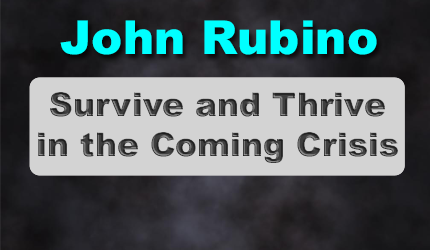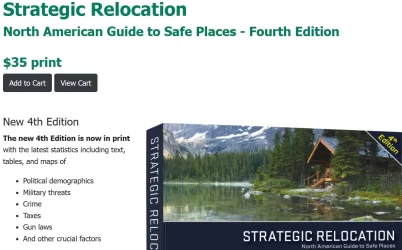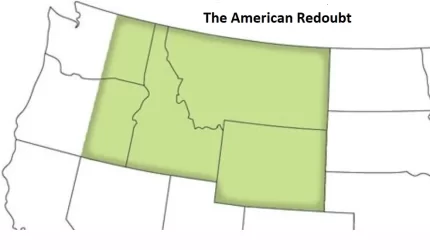June 27, 2023 | Strategic Relocation — Why, Where, And How

A lot of people are moving these days, for a lot of reasons.
But one of the biggest reasons is fear. Some badly-run cities and states are accumulating debt at a rate that guarantees massive future tax increases and cuts in essential services. Others have normalized crime to the point that city centers resemble a zombie apocalypse. These are dangerous, disheartening places, that are likely to become more so with time.
For someone living in such an evolving hellhole, getting out asap might seem like a quick and logical fix. But where to? There are hundreds of less-threatening possibilities, each with unique strengths and weaknesses. Choosing one from such a long list is a challenge. But it is doable.
First, look in the mirror
Why do you want to move, and how do you envision the next stage of life? If you love cities but hate what your city has become, your choice is relatively straightforward. Just move to Austin, Miami, Nashville, or one of the other dozen or so up-and-coming, apparently well-run cities where you can keep the good parts of your old life and discard the bad.
Same thing if you want to get back to nature and/or become part of a smaller community. Study the many “best small towns in America” lists and pick one that works for you. By the way, in the past few years satellite internet tech has progressed to the point that most online jobs can be done remotely from pretty much anywhere.
Deeper concerns
If your concerns run deeper, to the financial instability, civil unrest, and authoritarianism that seem imminent, then your process is more complicated. In a financial crisis or breakdown in the food supply chain, no city will be safe, and smaller towns and rural areas will only thrive if they have certain fairly specific characteristics. Some things the best place for riding out the storm would have:
Distance from major cities. The typical major city has, at best, a few weeks of food on hand. What happens when new supplies stop coming? Chaos, obviously, as cars full of hungry, desperate people swarm the surrounding countryside in search of their next meal. So your ideal future home would be more than a full tank of gas away from the nearest big city.
Access to food and water. Many western states depend on snowmelt running through a handful of rivers to fill a few big reservoirs. One of the first things to go in a crisis will be the agreements that allocate this water, leaving some places high and dry. Food, meanwhile, is produced in some places and exported to others. So it’s better to be in a place with plenty of water and lots of farms. One published list of states with the most water includes Alaska, Michigan, Florida, Wisconsin, Louisiana, California, New York, Minnesota, and North Carolina.
Moderate climate. Brutal winters and extended summer droughts make everything harder. So the ideal location would have seasons in which life doesn’t stop because of snow, rain, or heat.
Low population density. As a general rule, the more crowded a place, the crazier it can get in a crisis. So a low-population state or region is much safer than a big city or sprawling megalopolis. Low-population states include Alaska, Wyoming, Montana, North Dakota, South Dakota, New Mexico, Idaho, Nebraska, Nevada, and Kansas.
Freedom-oriented culture. States in which rural voters have influence tend to be less susceptible to authoritarianism. Note how different states behaved during the recent pandemic. So — a very general rule of thumb — avoid places that seem likely to panic in a crisis and seek out places where the interests of landholders, farmers, and small towns dictate policy.
Low land prices. Today’s real estate market is an epic bubble, which makes relocating far more expensive than it used to be. A lot of obvious destinations — because they’re also obvious to the people fleeing San Francisco and New York — have already been discovered and are now prohibitively expensive. So it might be wise to look off the beaten track for places that meet most criteria but not all. People with the skills to take on a fixer-upper have a big advantage in this kind of real estate market.
Rare natural disasters. Just about every state has something to worry about on this front, from earthquakes to hurricanes to fires. A propensity for one or more of these things isn’t a deal breaker but you don’t want to flee societal breakdown only to be wiped out by a recurring natural event. So give preference to places that have relatively few natural disasters. And if, for instance, you move to Florida for its politics despite it being in hurricane alley, skew your prepping toward that particular kind of risk.
Low taxes. High-tax states tend to be badly-run states. Very few of them appear on the many “best of” lists in this space.
Favorable gun laws. There’s a saying, “If you can’t defend your rights, you have no rights.” This becomes more true as societal stress increases, so a state that values its gun owners gains lots of points in this search.
The overall best states
There is no one perfect place for strategic relocation. But some states that appear on various “best of” lists are Idaho, Kansas, Maine, Missouri, Montana, North Carolina, North and South Dakota, Ohio, Oklahoma, Tennessee, Texas, and Wyoming.
More Resources
Security consultant Joel Skousen may have coined the term “Strategic Relocation” with his book on the subject:

James Wesley Rawles, a big name in the pepper world, coined another term that pops up frequently: the American Redoubt. Rawles researched the factors that make a place suitable for riding out the coming storm and concluded that one part of the country is the most attractive.

And here are some Babylon Bee videos on Californians moving to Texas:
STAY INFORMED! Receive our Weekly Recap of thought provoking articles, podcasts, and radio delivered to your inbox for FREE! Sign up here for the HoweStreet.com Weekly Recap.
John Rubino June 27th, 2023
Posted In: John Rubino Substack
Next: Leaping Short-Term Rental Supply »












It’s always a pendulum given enough time. You can’t beat the weather in California. It is also strategically located in terms of trade and has the greatest concentration of scientific “brain-power” in the USA. “The political “issues” that befall California are more or less everywhere to varying degrees. The weather and location will always attract “money”. The more wealth, the more the state’s ability to swing that pendulum back in the opposite direction. There’s still some gold left “in them there hills”.